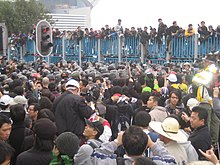
Back انتقاد منظمة التجارة العالمية Arabic انتقادها از سازمان تجارت جهانی Persian Առևտրի համաշխարհային կազմակերպության քննադատություն Armenian Dünya Ticaret Örgütü'ne yönelik eleştiriler Turkish 对世界贸易组织的批评 Chinese

Since its creation in 1995, the World Trade Organization (WTO) has worked to maintain and develop international trade. As one of the largest international economic organizations (alongside the International Monetary Fund (IMF) and the World Bank), it has strong influence and control over trading rules and agreements, and thus has the ability to affect a country's economy immensely.[1] The WTO policies aim to balance tariffs and other forms of economic protection with a trade liberalization policy,[2] and to "ensure that trade flows as smoothly, predictably and freely as possible".[3] Indeed, the WTO claims that its actions "cut living costs and raise standards, stimulate economic growth and development, help countries develop, [and] give the weak a stronger voice."[4] Statistically speaking, global trade has consistently grown between one and six percent per annum over the past decade,[5] and US$38.8 billion were allocated to Aid for Trade in 2016.[6]
Yet several criticisms of the WTO have arisen over time from a range of fields, including economists such as Dani Rodrik[7] and Ha Joon Chang,[8] and anthropologists such as Marc Edelman,[9] who have argued that the institution "only serves the interests of multinational corporations, undermines local development, penalizes poor countries, [and] is increasing inequality", and have argued that some agreements about agriculture and pharmaceutical goods have led to restricted access to food and healthcare, thus causing large numbers of deaths.[10] Several factors are alleged to contribute to these conditions, including but not limited to: the most favoured nation rule (MFN), national treatment policies, and failure to regard the infant industry argument.[11] Critics argue that the policies that support these principles fail to protect developing nations, and in some cases take advantage of them. For example, UNCTAD estimates that market distortions cost developing countries $700 billion annually in lost export revenue.[12]
- ^ "The Reporter". NBER. Retrieved 2024-03-06.
- ^ "Promoting fair competition". Archived from the original on 2015-06-06. Retrieved 2015-06-30.
- ^ "WTO Homepage". Retrieved 2015-06-29.
- ^ "WTO | 10 things the WTO can do". www.wto.org. Retrieved 2024-03-06.
- ^ "Global trade growth loses momentum as trade tensions persist". www.wto.org. Retrieved 2024-03-06.
- ^ WTO, WTO Annual Report 2019, introduction (WTO 2019), 6.
- ^ Dani Rodrik, “The WTO Has Become Dysfunctional.” Financial Times, August 5, 2018. https://drodrik.scholar.harvard.edu/files/dani-rodrik/files/the_wto_has_become_dysfunctional_financial_times.pdf (accessed April 26, 2020).
- ^ Ha Joon Chang. Kicking Away the Ladder: Development Strategy in Historical Perspective. London: Anthem, 2002.
- ^ Edelman, Marc. “Bringing the Moral Economy Back In…to the Study,of 21st Century Transnational Peasant Movements” American Anthropologist 107, no.3 (2005). ISSN 1548-1433 (accessed March 26, 2020).
- ^ "WTO | Seattle - misinformation". www.wto.org. Retrieved 2024-03-06.
- ^ Pettinger, Tejvan (2020-03-10). "Criticisms of WTO". Economics Help. Retrieved 2024-03-06.
- ^ Pogge, Thomas. "Poverty and Human Rights" (PDF).